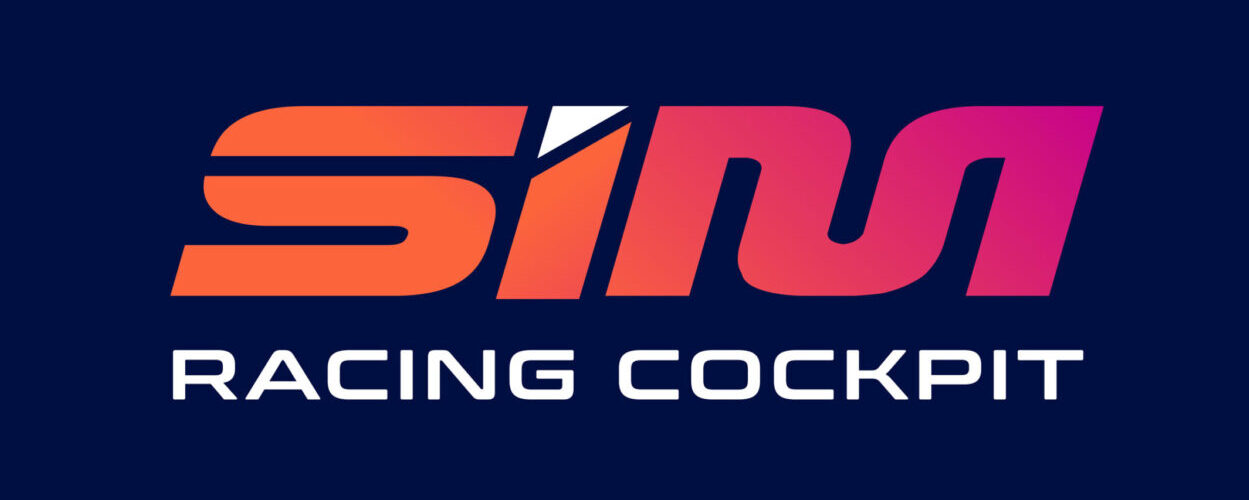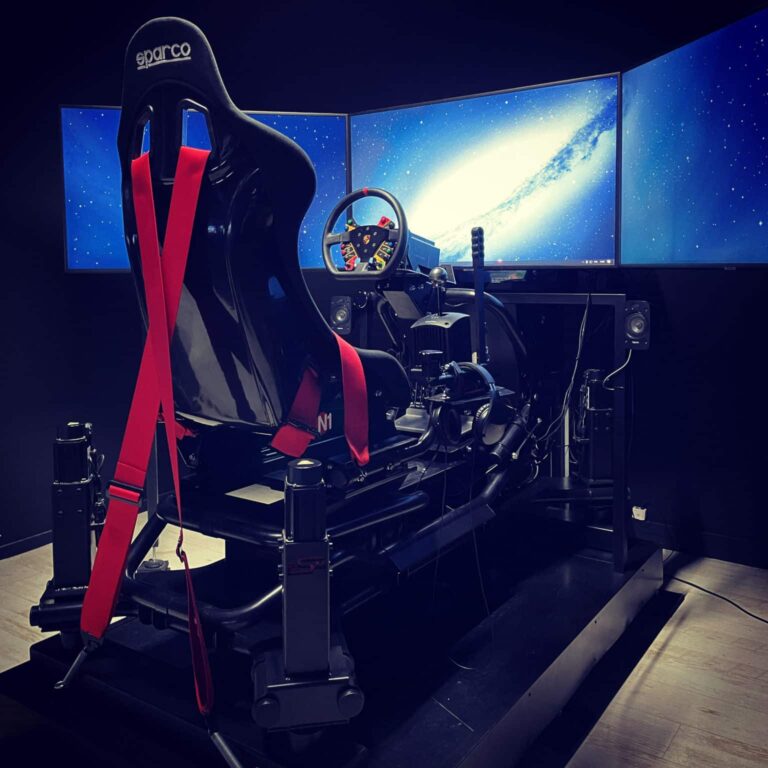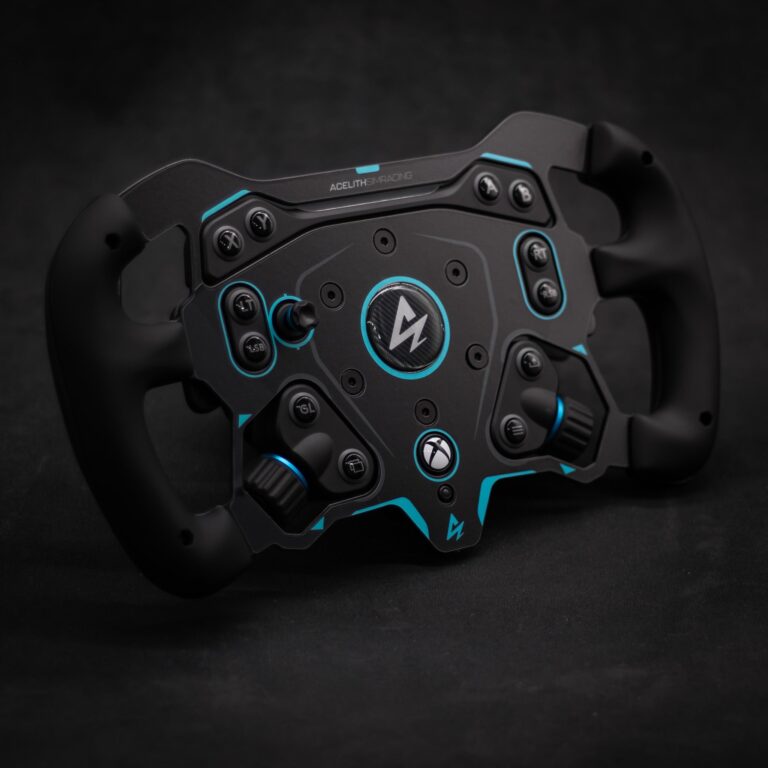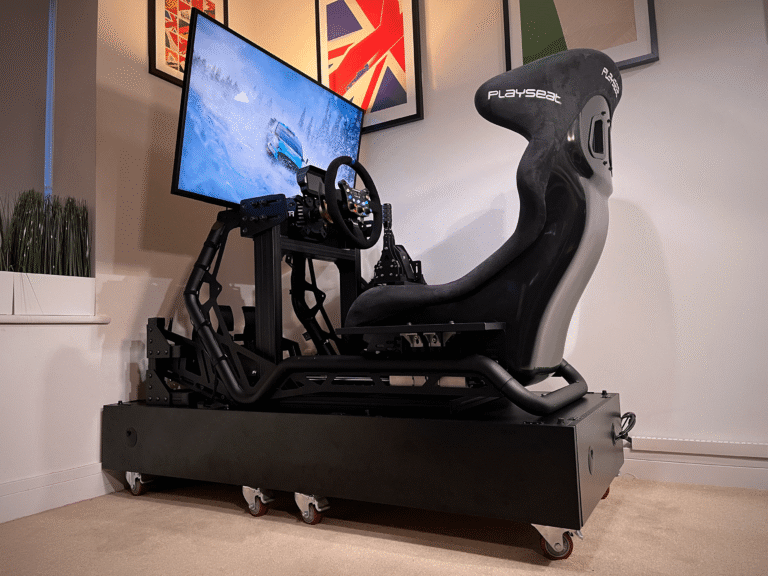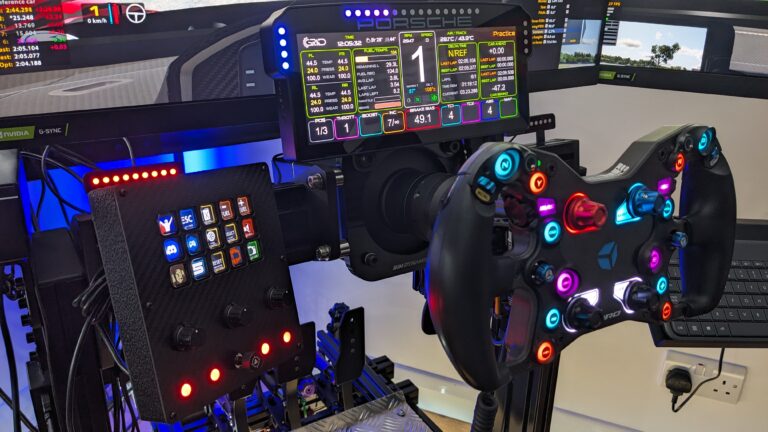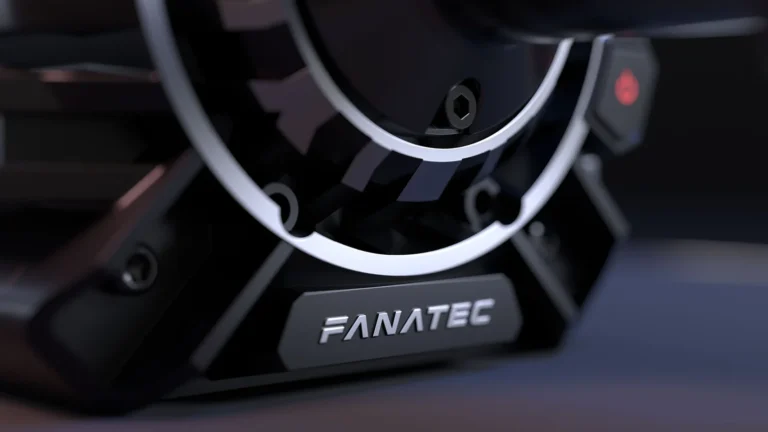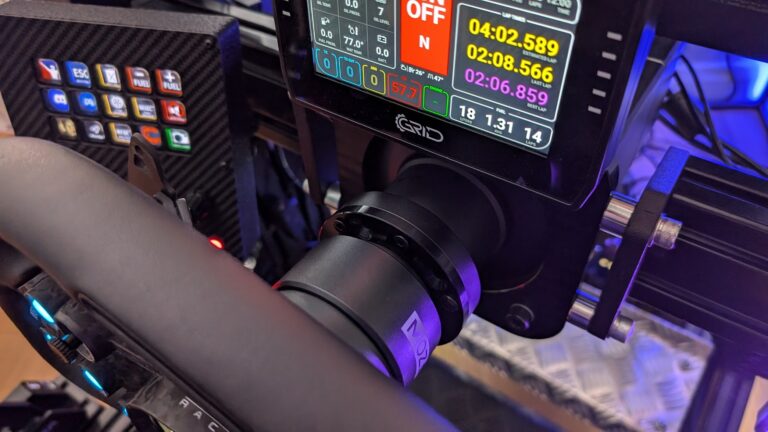Featured image: my sim racing PC with a Zotac RTX 4090 GPU
Build a sim racing PC or, grab a high-powered pre-built machine that nails iRacing and Assetto Corsa Competizione, rFactor2 and pretty much any other racing simulator without breaking a sweat with our latest update to our sim racing PC buyer’s guide.
Sim racing has enjoyed a significant boost in popularity over the last few years, and while you do need to make a pretty sizeable upfront investment in your equipment, thankfully it’s a fraction of the expense associated with motorsport in real life. In the past few months, gaming PCs with really high specifications have become cheaper, while for the DIY crowd, GPUs are more available than they have been for a long time.
Thankfully, we’re getting past that weird time when PC components were hard to get hold of. GPU Stock shortages are a thing of the past, with my machine happily featuring an RTX 4090 GPU. The latest RTX 50-series and AMD RX 9000 cards are now readily available, though you’ll want to check your preferred vendor stock levels whilst you’re doing your research.
Table of Contents

Sim racing games vary in their power needs. Assetto Corsa Competizione is extremely power-hungry, whereas iRacing is arguably less so. In any case, it’s best to choose a fast CPU (as most of the physics calculations happen on the CPU) and the best-spec GPU you can afford.
Critically, the CPU and GPU must be balanced, performance-wise. It’s a bad idea to buy a 4090 if you’re running an older-generation processor, as the CPU can become bogged down by the high data transfer rate of the GPU. Put simply, you won’t get a performance boost by adding the latest GPU to an old sim racing PC.
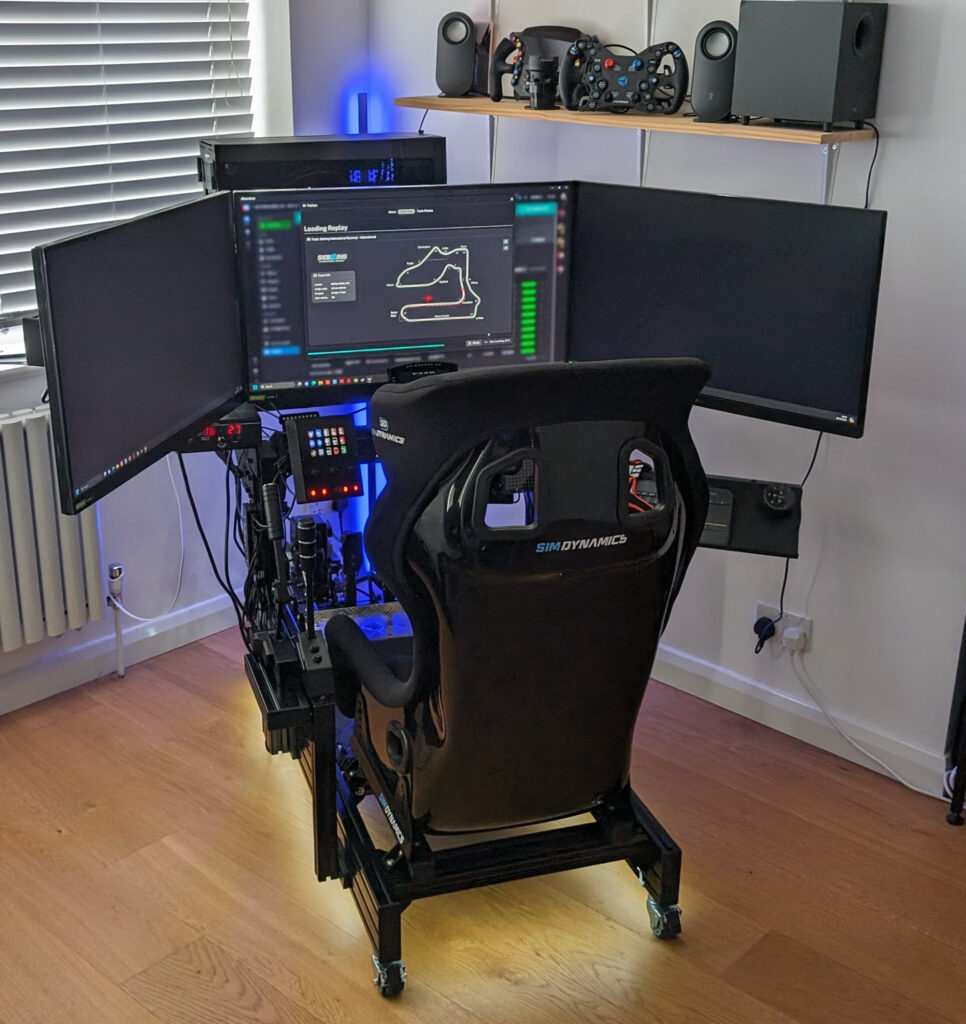
Your gaming PC might also be your “daily driver” for work, too. So one moment you’re piloting an F1 car through the curves at Eau Rouge/Raidillon then the next, you’re building a spreadsheet for work. So, it’s important to make sure that when you decide to switch from gainful employment to running a racing simulator, you will have enough processing power in the tank to run your racing game titles smoothly.
Why you need a powerful PC for sim racing
Rendering a simulated environment leans heavily on the performance potential of your PC hardware. For me personally, I love to use my equipment to its fullest.
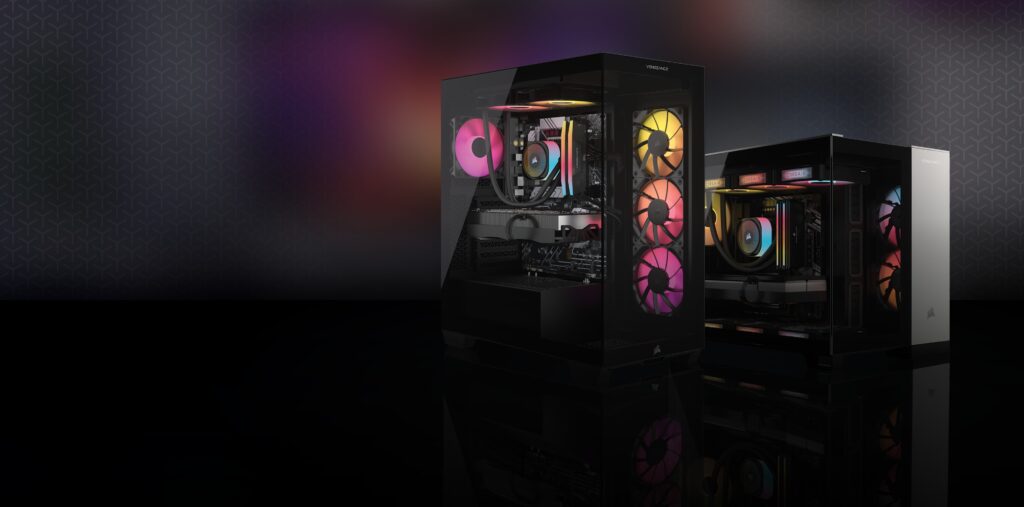
That means iRacing settings are on max, and components can get hot! Running iRacing is a walk in the park for high end sim racing PCs, but I appreciate that it’s not achievable for everyone in the room. So, as a rule of thumb, try to acquire a motherboard, case, and PSU that will support later hardware upgrades and focus mostly on getting your hands on the most powerful GPU you can find.

There are a few golden rules worth noting in the gaming world. Firstly, you should consider pushing your limits in terms of your budget when it comes to choosing parts for your PC.
When buying PC hardware, it’s good practice to invest in the future, so don’t automatically choose the cheapest part, as after a few years, you might need to replace it again.
If you buy with this strategy in mind, you’ll be able to upgrade economically in the future, and you should aim to purchase something that will last you at least five years, or preferably up to ten years.
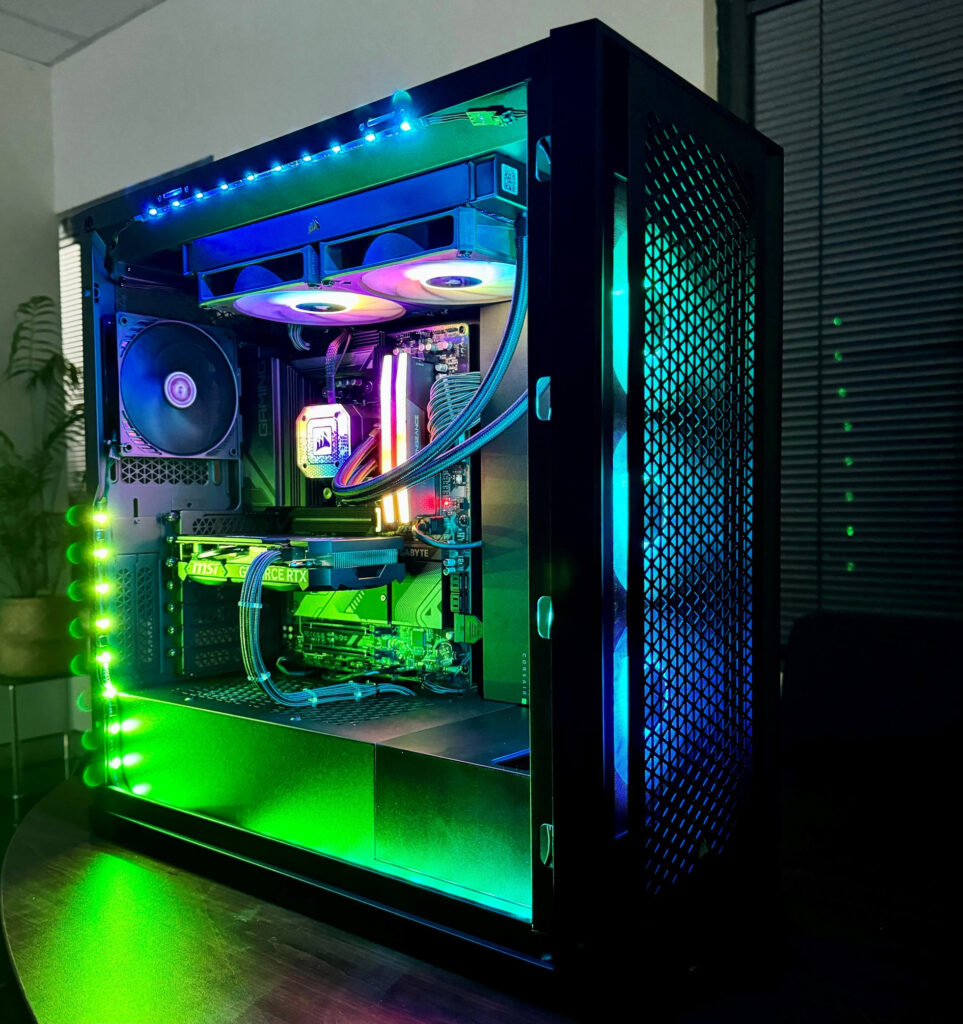
Secondly, there’s the question of whether to buy a pre-built gaming PC or source the components individually and build the PC yourself.
Both options are acceptable for sim racing PCs, with the main advantages of going down the DIY route being that you can decide which parts go into the build, you might be able to save a little bit of cash, and some people simply enjoy the process of putting the rig together themselves.
Apart from that, you’ll just be splitting hairs trying to find out which way is better, and the truth is, as long as your PC performs well enough to run your sim software smoothly, it doesn’t matter much who put it together.
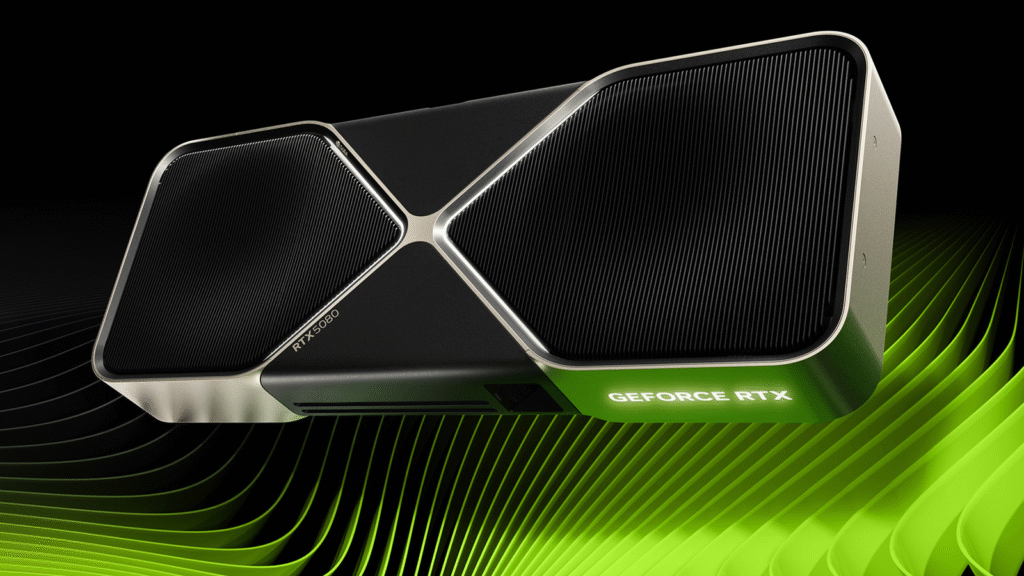
Finally, you need to consider what kind of strain a sim game puts on your PC hardware. For many modern PC games, the graphics processing unit, or GPU, is king. It’s what handles all the heavy lifting of making games look great. However, for driving simulators such as iRacing, Assetto Corsa Competizione, rFactor 2, etc., the CPU is also significant, as it handles the calculations to make the cars feel true-to-life.
So, when you’re selecting your PC parts, keep these kinds of things in mind as what’s often needed to play RPG or FPS games doesn’t exactly translate into what’s required for a racing sim.
What PC spec should I aim for to run iRacing or Assetto Corsa well?
Since iRacing and Assetto Corsa are among the most popular, realistic, and competitive simulators currently available, I’ll use them as a benchmark for the specs you should aim for with your new PC.
Looking at the quoted system requirements from both developers, you’ll notice a minimum, recommended, and high-end set of requirements. So, with what I just mentioned about futureproofing your PC, I strongly suggest using the recommended requirements as a baseline and the high-end if your budget allows it.
So, here are my recommendations for the minimum system requirements for a PC spec that will provide smooth gameplay with almost no compromises on the settings side, unless you’re running extremely high-resolution settings on your sim racing monitors.
| Operating System | Windows 11 64-Bit (optimised for modern hardware) |
| Processor (CPU) | Intel Core i7-14700K or AMD Ryzen 7 7800X3D* |
| Memory (RAM) | 32 GB DDR5 6000MHz CL30 |
| Graphics (GPU) | NVIDIA GeForce RTX 4070 Ti or AMD Radeon RX 7900 XT* |
| Storage (HDD and SSD) | 2TB M.2 NVMe PCIe 4.0 SSD (Gen 5 optional) |
Pre-Built Gaming PCs
If you decide you’d rather buy a ready-built PC, there are a few choices that stand out that are suitable for sim racing rigs. Going down this route is recommended if you are either unable or unwilling to build your own PC, and let’s face it, it saves you all the time involved with the building process. It’s also a great choice if you are buying a PC as a gift.
Latest Gaming PC Deals on Amazon
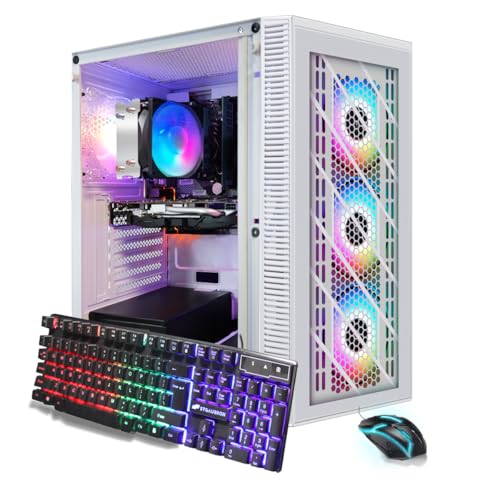
STGAubron RGB PC Computer Desktop
- AMD Ryzen 7 5700G up to 4.6GHz
- 16GB DDR4 RAM, 1TB SSD storage
- WiFi 6 & Bluetooth 5.2 connectivity
- RGB fans x4, keyboard & mouse included

ALCPOK Gaming Desktop AMD Ryzen 7 5700G
- AMD Ryzen 7 5700G processor, 16GB DDR4
- 1TB M.2 SSD for fast load times
- Integrated graphics with ARGB cooling
- 550W Bronze PSU, office & light gaming ready

STGAubron Gaming PC with GTX 1660 Ti 6GB
- Intel Core i7 up to 3.9GHz, 32GB RAM
- NVIDIA GeForce GTX 1660 Ti 6GB GDDR6
- 1TB SSD, WiFi & Bluetooth 5.0
- RGB fans x6, gaming peripherals included

iBUYPOWER Scale Orange Gaming PC
- AMD Ryzen 5 5500, RTX 3050 6GB GPU
- 16GB DDR4 RAM, 500GB NVMe SSD
- Tempered glass RGB case, WiFi ready
- Gaming keyboard & RGB mouse included
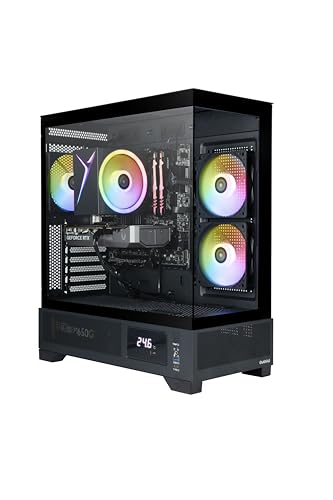
ZOTAC MEK AI-Enhanced Gaming PC
- NVIDIA RTX 5050 with DLSS & ray tracing
- AMD Ryzen 5 5500 up to 4.2GHz, 16GB DDR4 RGB
- 1TB NVMe SSD, 650W 80+ Gold PSU
- WiFi 6E, crafted in USA, 3-year GPU warranty

ALCPOK Gaming PC with RTX 5060 8GB
- Intel Core i5 14400F, RTX 5060 8GB GDDR7
- 32GB 3200MHz RAM, 1TB NVMe M.2 SSD
- Five ARGB fans for optimal cooling
- 550W Bronze PSU, versatile gaming & office use

MSI Codex Z2 Gaming Desktop with RTX 5070
- AMD R7-8700F, NVIDIA RTX 5070 GPU
- 32GB DDR5 RAM, 2TB NVMe M.2 SSD
- Four-fan cooling system, VR-ready
- MSI RGB lighting with customization software
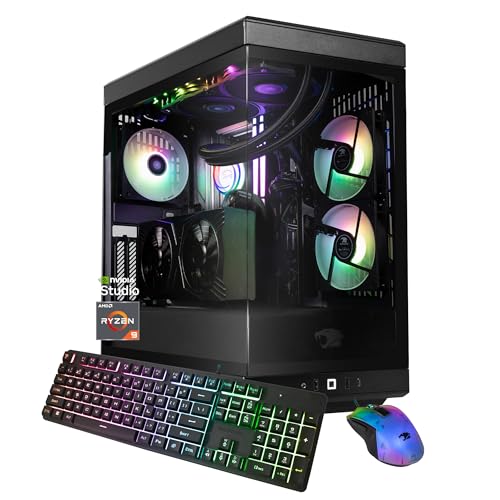
iBUYPOWER Y40 PRO Gaming Desktop
- AMD Ryzen 9 7900X, RTX 5070Ti 16GB
- 32GB DDR5 RGB 5200MHz, 2TB NVMe SSD
- Tempered glass RGB case, 802.11AC WiFi
- Gaming keyboard & RGB mouse, no bloatware
A lot of sim racers simply don’t want to build their own PC, and that’s fine! Especially if you’re looking to max out your iRacing FPS with a 5090 RTX equipped PC it might be easier to find stock from pre-built gaming PC vendors. In fact, it’s the larger PC builders who can get the stock and funnily enough they want to sell GPUs as part of a ready-built package.
The same is also true of certain CPUs and power supplies that are in high demand, so buying a PC that already has all these parts included could be the way to avoid long waiting times for parts to come back into stock.
Worth noting that in 2025, DDR5 has become the standard, with PCIe 5.0 SSDs offering significantly faster load times – particularly beneficial for larger sim racing titles. The new RTX 50-series and AMD RX 9000 cards are pushing the boundaries of what’s possible in sim racing, with higher-end cards easily delivering 4K 120fps gaming at maximum settings.
Entry-Level (£500-£1,000)
Right, if you’re just getting started in sim racing and want something that’ll handle iRacing without any fuss, this is where you should be looking. I’ve been testing entry-level systems and honestly, the performance you get for under a grand these days is pretty impressive.
Ember 4500 – RX 6400
Starting at the absolute budget end, the Ember 4500 – RX 6400 from Stormforce Gaming comes in at £549.99. Now, I’ll be straight with you – this is about as basic as you want to go for sim racing. The AMD Radeon RX 6400 with 4GB GDDR6 will handle iRacing on medium settings at 1080p, but don’t expect miracles.
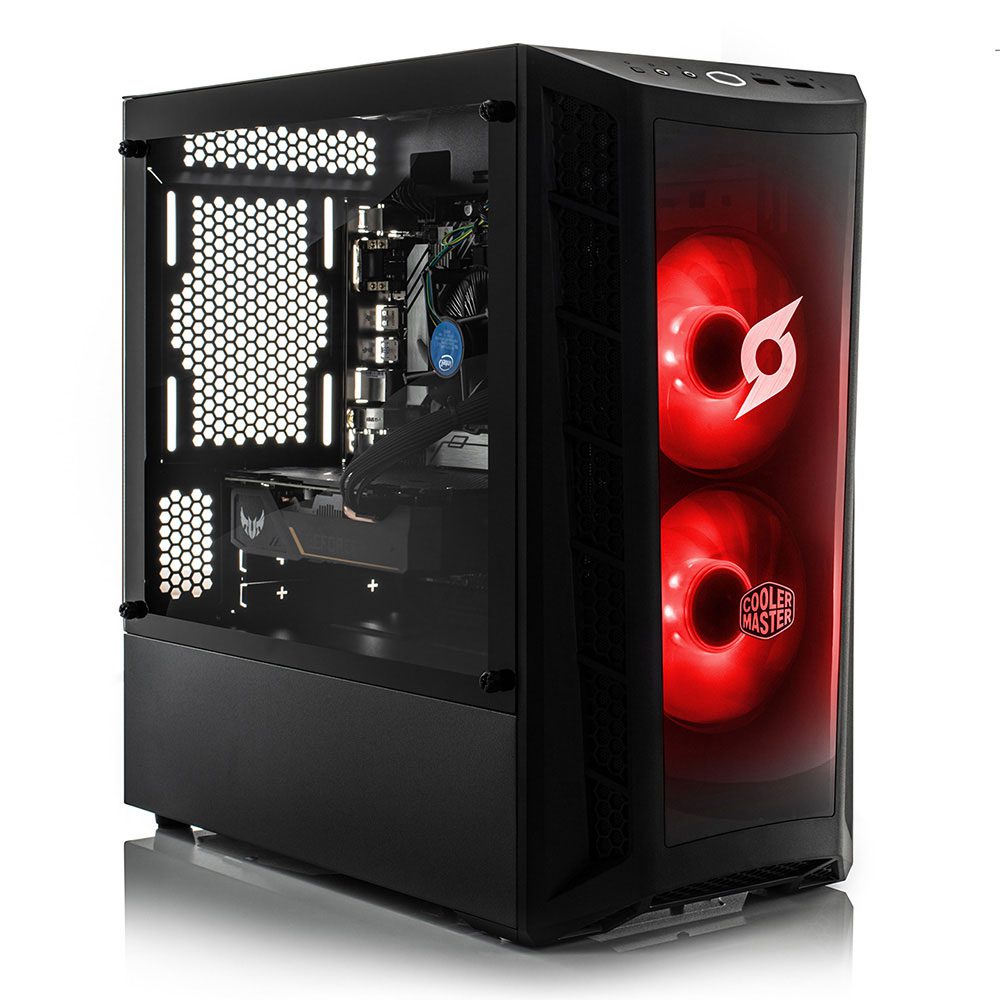
The system pairs this with an AMD Ryzen 5 4500 processor, which is a 6-core, 12-thread CPU that’ll manage physics calculations adequately. It’s perfect if you’re dipping your toe into sim racing and mainly play less demanding titles. The 4GB of VRAM is limiting, but for the price, it’s a decent starting point.
Rogue Elite AMD
Step up to £649.99 and you’ll find the Rogue Elite AMD. This is where things get interesting. You’re getting a proper gaming experience here with the ability to run most sims on high settings at 1080p.
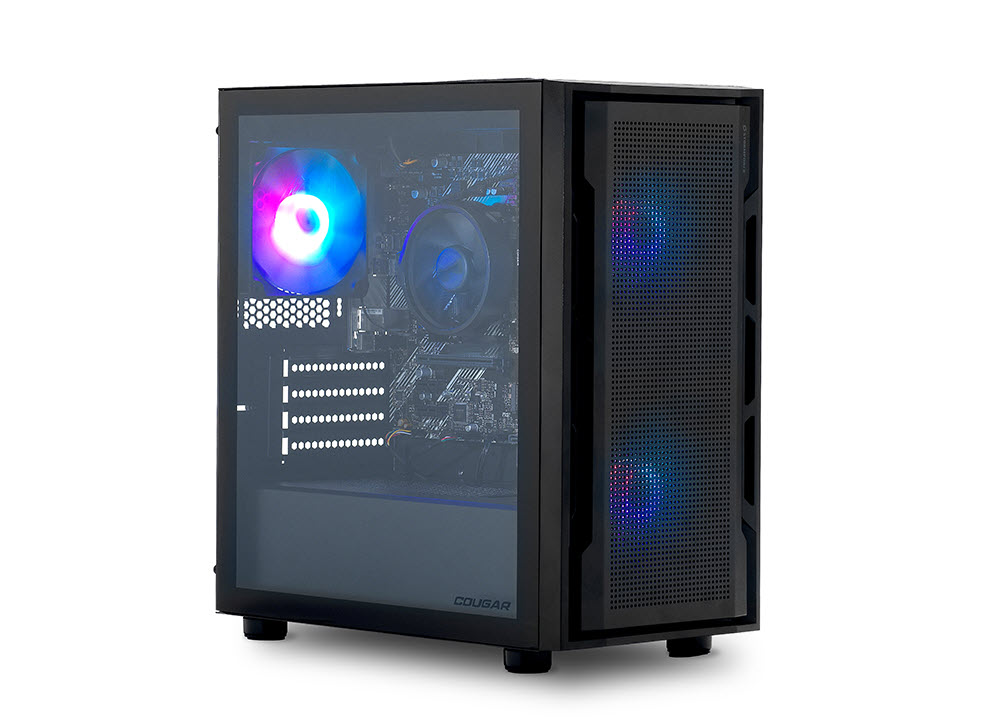
The included 100Hz monitor bundle option is spot on for getting started – that higher refresh rate makes a real difference in racing sims where every millisecond counts. The system includes Windows 11 and comes with a decent RGB case that’ll look the part next to your rig.
Spark 12400F – RTX 4060
Topping out this category at £799.99, the Spark 12400F – RTX 4060 is what I’d personally recommend if your budget stretches this far. The Intel Core i5-12400F is a brilliant processor for sim racing – 6 cores and 12 threads with excellent single-thread performance where it counts. Paired with an RTX 4060 (16GB variant), you’re looking at smooth 1440p performance with room to push some settings higher. The RGB case with excellent thermal performance ensures everything stays cool during those marathon racing sessions.
Mid-Range (£1,000-£2,000)
This is where it gets interesting. Spend a bit more and you’re into proper sim racing territory. These systems will handle pretty much anything you throw at them, including VR if that’s your thing.
Corsair Vengeance i7300
Just over the wire at £1,088 ($1,399), the Corsair Vengeance i7300 featuring an Intel Core i5-12600K and RTX 3070 is brilliant value. The i5-12600K offers 10 cores (6 performance + 4 efficiency) with a boost clock up to 4.9GHz – perfect for sim racing where physics calculations can bog down lesser processors.
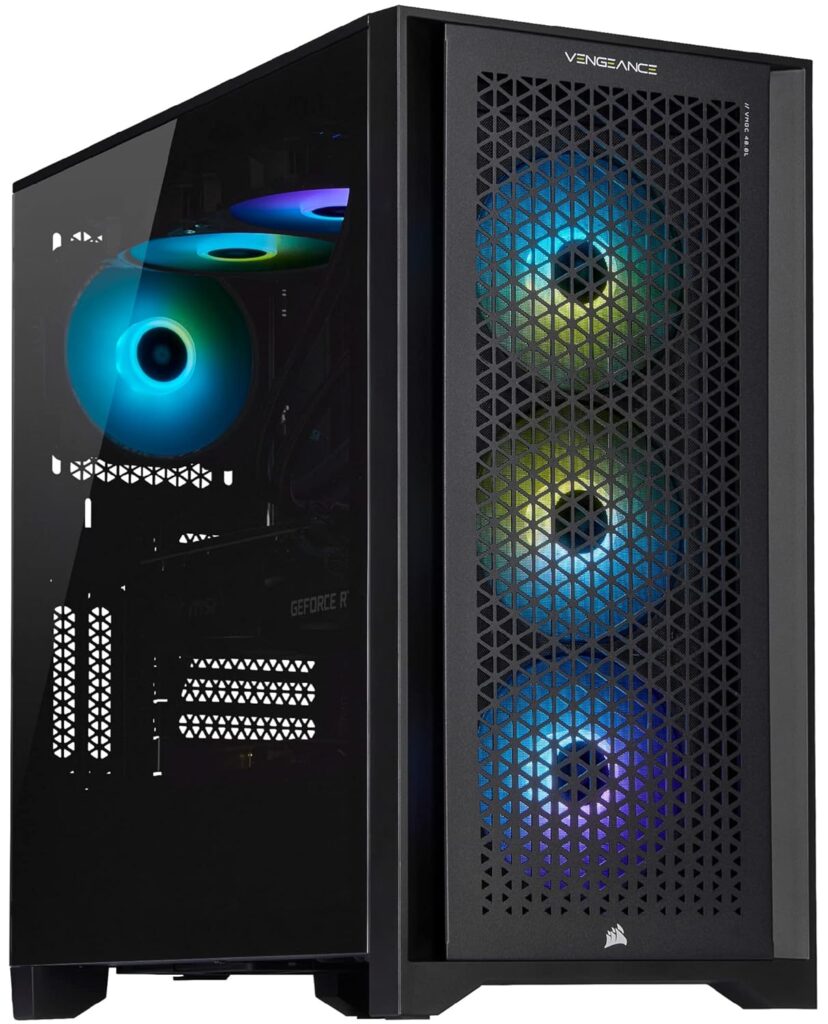
With 16GB of DDR4 3200MHz memory and a 1TB NVMe SSD, this will handle smooth 1440p gaming without breaking a sweat. The RTX 3070 with 8GB GDDR6 remains a solid choice for sim racing, offering excellent performance per pound.
Corsair Vengeance a7500
The Corsair Vengeance a7500 brings AMD’s latest Ryzen 5 9600X processor to the table. This 6-core, 12-thread CPU is built on the Zen 5 architecture and pairs beautifully with the new RTX 5060. The system includes 32GB of DDR5 memory – a significant upgrade that ensures smooth performance even with multiple applications running.
The 3500X mid-tower case features Corsair’s stunning wraparound glass aesthetic, whilst the NAUTILUS 240mm liquid cooler keeps temperatures in check. With six RS120 ARGB fans providing concentrated airflow, this system runs cool and quiet.
Corsair Vengeance i7400
The Corsair Vengeance i7400 at £1,326 ($1,699) offers Intel’s i5-12600KF paired with an RTX 4060. What sets this apart is the RTX 4060’s DLSS 3 support and superior ray tracing performance.
The 16GB DDR4 3200MHz configuration is perfectly adequate for current sim racing titles, whilst the 1TB NVMe SSD provides rapid load times. This system excels at both 1080p and 1440p gaming, making it ideal for those running single or triple monitor setups.
Y40B 7800X3D – RX 7900XT
If you can stretch to £1,699.99, the Y40B 7800X3D – RX 7900XT is phenomenal. The AMD Ryzen 7 7800X3D is arguably the best gaming CPU money can buy right now, featuring 8 cores with AMD’s 3D V-Cache technology that dramatically improves gaming performance.
Paired with the Radeon RX 7900XT (20GB GDDR6), you’re looking at 4K performance that’ll make your jaw drop. The Hyte Y40 case is a proper showpiece too, perfect for those who want their PC to look as good as it performs.
High-End (£2,000-£3,000)
If you’re serious about lap times and want to experience sim racing at its absolute best, this is where you need to be looking. These machines will handle triple 1440p monitors or high-refresh 4K without breaking a sweat.
Corsair Vengeance i7500
At £2,099.99, the Corsair Vengeance i7500 steps things up considerably. Intel’s Core i5-14600KF offers 14 cores (6 performance + 8 efficiency) with boost clocks reaching 5.3GHz. Paired with the RTX 5060 and 32GB of DDR5 memory, this system handles demanding sim racing scenarios with ease.
The 3500X case with wraparound glass looks stunning, whilst the NAUTILUS 240mm AIO keeps everything cool. The inclusion of Corsair’s iCUE software allows for comprehensive system monitoring and RGB control.
Corsair Custom Gaming PC
The Corsair Custom Gaming PC options in this price range offer something different – customisation. Starting with premium components like the Intel Core i7-13700K or AMD Ryzen 9 7900X, you can tweak the spec to your exact requirements.
These systems typically include 32-64GB of DDR5 memory, high-capacity NVMe storage, and your choice of RTX 40 or 50-series graphics. The ability to select specific components means you can optimise for your particular use case, whether that’s VR racing or triple 4K monitors.
Corsair Vengeance a7300
The Corsair Vengeance a7300 brings AMD’s Ryzen 9 7900X to the party. This 12-core, 24-thread monster features a base clock of 4.7GHz and boost up to 5.6GHz. When paired with 64GB of DDR5 5600MT/s memory and an RTX 4090 (24GB GDDR6X), you’re looking at a system that’ll handle anything you throw at it. The 2TB NVMe SSD ensures rapid loading times, whilst Corsair’s renowned build quality means this system will run reliably for years to come.
Premium (£3,000+)
No compromise territory here. If you want the absolute best and budget isn’t a concern, these are the machines that’ll have you setting personal bests.
Corsair Vengeance i8200
Starting at £3,822 ($4,899), the Corsair Vengeance i8200 series represents the pinnacle of Intel-based gaming systems. The i9-14900K processor features 24 cores (8 performance + 16 efficiency) with boost clocks up to 6.0GHz.
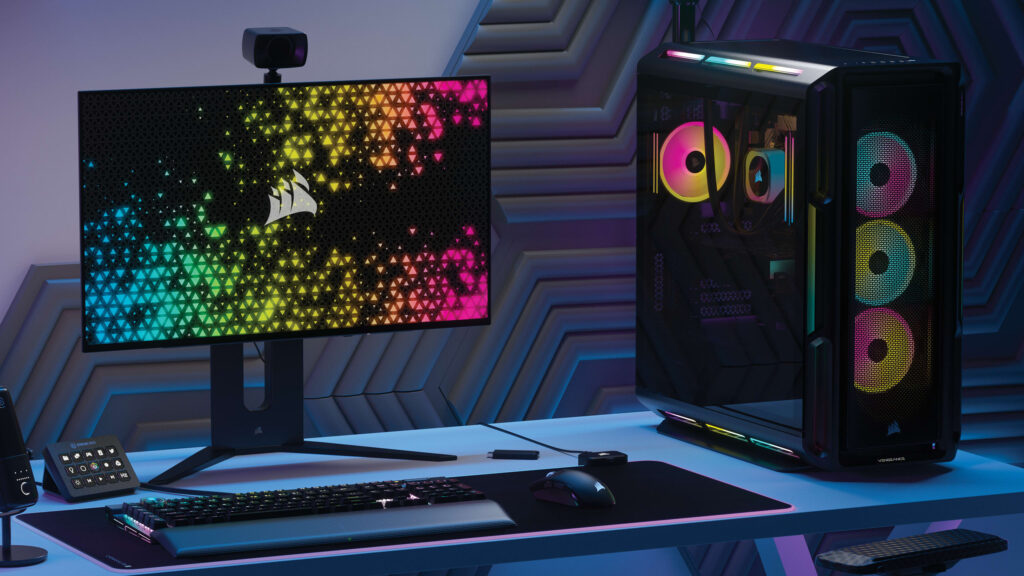
Paired with an RTX 4090 and 64GB of DDR5 6400MT/s memory, this system delivers uncompromising performance. The 4TB of NVMe storage (configured as 2x2TB for optimal performance) means you’ll never run out of space for your sim library.
The iCUE LINK edition adds Corsair’s revolutionary new ecosystem for seamless component integration.
Corsair Vengeance a8200
At £4,680 ($5,999), the Corsair Vengeance a8200 showcases AMD’s Ryzen 9 9950X3D – a 16-core beast with 3D V-Cache technology.
Combined with the new RTX 5090, this system represents the absolute cutting edge of gaming performance.
The 64GB of DDR5 memory and 6TB of storage (2TB + 4TB configuration) ensure you’re ready for whatever the future brings. The 5000T RGB mid-tower case provides excellent cooling with the iCUE LINK TITAN RX 360mm AIO, whilst looking absolutely stunning.
Custom Builds
At this price point, I’d seriously consider going custom with Corsair’s configurator or other premium builders. You’re looking at top-tier components like the RTX 4090 or upcoming RTX 5090, paired with the latest Intel Core i9 or AMD Ryzen 9 processors. These systems will handle triple 4K monitors, full motion rigs, and whatever the next generation of sims throw at them. Features like custom water cooling, premium power supplies, and hand-selected components ensure maximum performance and reliability.
Bear in mind that at this level, you’re future-proofing for the next five years at least. The performance headroom means you’ll be ready for whatever comes next in sim racing technology.
Quick Note on Current Hardware
Worth noting that we’re in a brilliant spot hardware-wise in 2025. The new RTX 50-series GPUs are starting to appear, offering incredible performance improvements over the previous generation. AMD’s RX 9000 series is keeping NVIDIA honest on pricing too.
DDR5 has finally become the standard, with prices now reasonable compared to DDR4. If you’re building new, there’s no reason not to go DDR5. Similarly, PCIe 5.0 SSDs are worth the investment – the loading times on large tracks like the Nordschleife are noticeably quicker.
For sim racing specifically, CPU choice remains crucial. The physics calculations in modern sims love high single-core performance, so don’t skimp here. Intel’s latest offerings and AMD’s X3D chips are both excellent choices.
Building a Sim Racing PC
While building a new gaming PC may not be for everyone, it does have the advantage of letting you decide which parts go into the PC, which for sim racers may be of interest given the specific requirements needed for this type of gameplay.
So, if you’re a bit handy with a screwdriver and have sufficient patience, building your PC is the way to go. Plus, with services like PC Part Picker helping you figure out which components fit together, it’s never been more accessible to self-build.

If you’ve never built a PC before and would like to give it a try, I highly recommend watching this video from Linus Tech Tips. In this tutorial, he takes you the entire way through the build process, and by the end, you’ll know how to assemble your own gaming PC successfully:
RTX 5090 Gaming PCs
Power and Cooling Considerations
Modern high-end GPUs are power hungry. The RTX 4090 can pull over 450W under load, so ensure your PSU is up to the task. I recommend at least 850W for RTX 4080/5080 systems, and 1000W for 4090/5090 builds. Good case airflow is essential – these cards pump out serious heat during extended racing sessions.
Ray Tracing and DLSS
While ray tracing isn’t as prevalent in sim racing as other genres, titles like ACC and the upcoming AC Evo support it. DLSS, however, is a game-changer. DLSS 3’s Frame Generation can nearly double your frame rate in supported titles, making it possible to run higher settings whilst maintaining smooth performance.
For sim racing in 2025, I’d recommend nothing less than an RTX 4060 or RX 7600 for 1080p gaming. If you’re running triple screens or VR, you’ll want at least an RTX 4070 Ti or RX 7900 XT. And if budget’s no concern? The RTX 4090 remains king, though keep an eye out for the new RTX 5090 if you can find one in stock.
